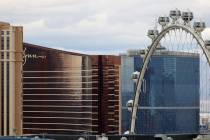Lee sees something in Full House Resorts — opportunity
Anyone who has followed Dan Lee over the years understands his motivation in launching a proxy fight for control of regional casino operator Full House Resorts.
He sees opportunity.
Lee, 56, is one of five shareholders controlling 6.2 percent of Las Vegas-based Full House. They want a special meeting to remake the board of directors and change the company’s direction, and asked the Securities and Exchange Commission last week for permission to approach other shareholders.
With market capitalization of $24.7 million and more than 18.87 million shares outstanding, a takeover of Full House is doable.
Lee said there is value in Full House, despite comments in an SEC filing that said management “failed stockholders” with “irresponsible stewardship” and a “reckless buying binge.”
The company reminds Lee of Pinnacle Entertainment 14 years ago.
In 2002, Lee stepped in as CEO of then-Hollywood Park Entertainment. The company was in default on its bank debt and bleeding money. Lee moved the corporate headquarters from Glendale, Calif., to Las Vegas, changed the company’s name and direction and started what has become a regional gaming powerhouse.
By the time Lee left Pinnacle in November 2009, the company owned market-leading casinos in Louisiana, Missouri, Indiana and Northern Nevada; tripled its cash flow from seven years earlier; and had a road map that helped direct the company’s continued growth.
Full House owns three casinos: one in Indiana, one in Mississippi, and one in Fallon — the Stockman’s Casino. The company also manages the Grand Lodge Casino at Hyatt Lake Tahoe under a lease agreement.
On Monday, Full House management said it engaged financial and legal advisers to evaluate “strategic alternatives,” including “a potential merger or sale of the company.”
Their hands won’t be forced by Lee and the shareholders group.
“The company believes that the dissident group are the wrong people, with the wrong agenda, at the wrong time,” Full House said in a statement.
That was just the company’s opening salvo.
According to Lee’s SEC filing, Full House’s stock price fell almost 60 percent in the past 12 months. The company has made bad investments. A halted acquisition of Tunica, Miss., hotel-casino this year cost Full House 97 percent of its $1.75 million escrow and $300,000 in professional fees.
The shareholders questioned the management compensation. Chairman and CEO Andre Hilliou has seen his salary and benefits increase 59 percent since 2013. Chief Operating Officer Mark Miller experienced a 78 percent jump in compensation during that same time period.
Meanwhile, Full House’s revenue declined 14.7 percent in the second quarter and is down 12.4 percent for the first six months of the year. It has lost $9.57 million so far in 2014.
“Over the past nine months, we have attempted to engage quietly and constructively with management and the board,” Full House investor Bradley Tirpak said. “We see great value and potential for the company, but the stock price reflects our belief that the market has lost faith in this management team.”
Full House disagreed with the “dissident” shareholders.
The company said it addressed economic pressure through cost-cutting measures, both at the properties and in corporate offices. The Tunica deal was abandoned when market dynamics changed, and finishing the transaction would have been more damaging.
Full House also questioned Lee’s departure from Pinnacle. He left the company after an outburst at a St. Louis County Council meeting during debate over Pinnacle’s second casino development in that market. They also wondered why Lee resigned from the Palms hotel-casino after eight months as CEO.
Lee, 56, is a former Wall Street analyst and chief financial officer of Steve Wynn’s Mirage Resorts in the 1990s.
He left the Palms in May, saying a serious bicycle accident “caused me to have a lot of thinking.” He never planned a long-term role there.
After leaving Pinnacle, Lee formed Creative Casinos and took with him a development project in Lake Charles, La., next to Pinnacle’s L’Auberge resort. He sold the western Louisiana site to Ameristar Casinos for $32.5 million in 2012. The development is owned by Tilman Fertitta’s Landry’s Corp. and will open this year as the Golden Nugget Lake Charles.
“Our profit from the 18 months of operations of that startup company exceeds the retained earnings from the entire 25-year history of Full House Resorts,” Lee said in an email. “Unlike the management of Full House, I have a history of making money for shareholders and investors.”
Battle lines are drawn.
Howard Stutz’s Inside Gaming column appears Wednesdays and Sundays. He can be reached at hstutz@reviewjournal.com or 702-477-3871. Follow on Twitter: @howardstutz.






















